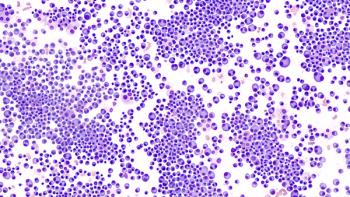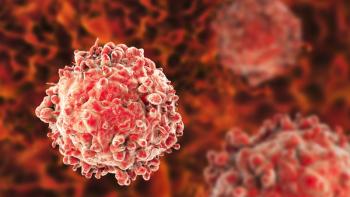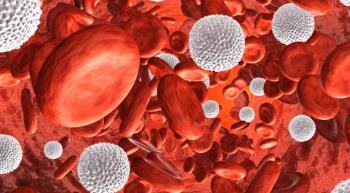
Patients with Blood Cancer and COVID-19 Fare Better with Convalescent Plasma Treatment
A retrospective cohort study found that convalescent plasma treatment resulted in a meaningful improvement in the 30-day mortality rate for patients with hematologic cancer and COVID-19.
A retrospective cohort study found that convalescent plasma treatment resulted in a meaningful improvement in the 30-day mortality rate for patients with hematologic cancer and COVID-19.1-2
The study evaluated the mortality rates of 143 patients with hematologic cancers who had received convalescent plasma, compared with 823 control patients. Evidence that patients fared better with the convalescent plasma treatment emerged from the fact that the crude mortality rate of convalescent plasma recipients (n = 19; 13.3%) was drastically lower than the control group (n = 204; 24.8%).
The difference between the groups remained meaningful even after results had been adjusted for potential confounding factors (HR, 0.60; 95% CI, 0.37-0.97; P = .03)and propensity score matching (HR, 0.52; 95% CI, 0.29-0.92; P = .03) using cox proportional hazards regression analysis.
“There is historical evidence of the efficacy of passive antibody therapy for infectious diseases when given early in the disease before the development of endogenous antibody responses, including in severe acute respiratory infections. On this basis, interventional trials of convalescent plasma treatment for patients with COVID-19 are ongoing,” explained lead study co-author, Michael A. Thompson, MD, PhD, Aurora Cancer Care, and colleagues. “To our knowledge, only one of these, COVID19-Convalescent Plasma for Treating Patients With Active Symptomatic COVID-19 Infection (FALP-COVID), is specifically recruiting patients with cancer.”
The researcher’s objective was to assess the effect of convalescent plasma treatment and survival rates in hospitalized adults by analyzing data from the COVID-19 and Cancer Consortium registry.
The study considered data from 966 individuals, who were a median age of 65 years. The majority were male (n = 536). All patients were hospitalized and had both hematologic cancer as well as COVID-19. Data collection began on March 17, 2020 and extended through January 21, 2021.
The primary end point was 30-day all-cause mortality. During this time, 223 deaths occurred.
The study considered patients with severe COVID-19 for secondary subgroup analysis. Mortality rates proved to be consistently lower among the convalescent plasma group, even amongst pools of patients who were admitted to the intensive care unit (ICU) (HR, 0.40; 95% CI, 0.20-0.80) and those who required mechanical ventilatory support (HR, 0.32; 95% CI, 0.14-0.72).
One particularly striking result was that, of the 338 patients admitted to the ICU for severe COVID symptoms, the convalescent plasma recipients’ likelihood of survival was more than double that of the untreated group.
Further adjustments, such as consideration of different caliper sizes and randomization of matching orders, continued to yield consistent results.
Certain limitations emerged as a result the of ambiguity in time-to-event analysis in the setting. For example, the study did not take into consideration the time between COVID-19 hospitalization and plasma administration, and convalescent plasma reception at any time during COVID-19 hospitalization was classified as treatment exposure.3 This did not align with traditional clinical trial protocols where a certain time period defines the administration date (eg, <72 hours since hospital).
Furthermore, the study was unable to measure which antibody titers and levels in the plasma were administered, nor were they able to determine whether there was repeat dosing.
Similarly, the study did not note the status of the patient’s oxygen levels or if they required oxygen support during the duration of their hospitalization. This is critical information in creating an unbiased estimation, the study authors noted.
While the heterogeneity of hospitals provided a strength in terms of diversity, each community’s response to COVID-19 and various management or potential of hospitals as a result could also skew results across the different regions.
Future studies should look to address administration timing and repeated dosing in randomized trials, they added.
Nevertheless, the results in this article are described as “encouraging” by Gregory S. Calip, PharmD, MPH, PhD, Flatorin Health, Inc, in a published commentary about the study.3 He added that this study shows that future convalescents trials with patients with cancer are both necessary and well-motivated and that, “given the rarity of some hematologic cancer and historical barriers to clinical trial entry, high-quality real-world data should continue to play a crucial role in fully understanding the benefits of COVID-19 treatments in patients with cancer.” COVID-19 registries, Calip concluded, as well as machine curated data and physicians notes, should all be utilized for clinical analysis in studying COVID-19 therapies.
References
- Thompson MA, Henderson JP, Shah PK, et al. Association of convalescent plasma therapy with survival in patients with hematologic cancers and COVID-19. JAMA Oncol. 2021. doi:10.1001/jamaoncol.2021.1799
- Miller M. Blood cancer patients with COVID-19 fare better with convalescent plasma; 2021. Accessed June 29, 2021. https://www.newswise.com/coronavirus/blood-cancer-patients-with-covid-19-fare-better-with-convalescent-plasma/?article_id=753129&sc=dwhr&xy=10019792
- Calip GS, Miksad RA, Sarkar S. Time-related biases in nonrandomized COVID-19-era studies using real-world data. JAMA Oncol. 2021
Newsletter
Knowledge is power. Don’t miss the most recent breakthroughs in cancer care.






























































































